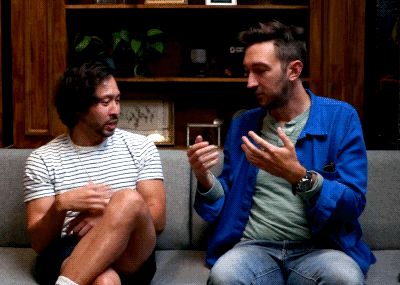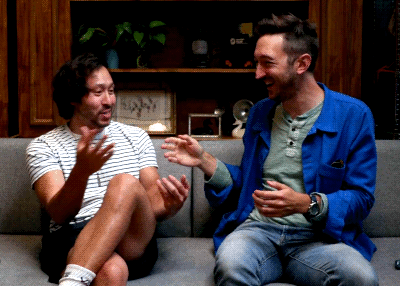#watcher weekly plus 124
Photo




Ryan: That kinda reminds of me of when someone goes in for a bro handshake, but the other person goes in for a—
Shane: That’s, uh—that’s me!
Ryan: —like a normal, and they have to, like, upgrade mid-shake.
Shane: ... Teach me how to do this!
Watcher Weekly+ // Episode 124
June 23, 2022
#watcher weekly +#Watcher#watcher entertainment#ryan bergara#shane madej#the bro handshake#ostensiblygif#watcher weekly plus 124
559 notes
·
View notes
Text
My WW Weight Watchers Journey. Weekly Weigh In and How To Deal With People Who Sabotage Weight Loss
My WW Weight Watchers Journey. Weekly Weigh In and How To Deal With People Who Sabotage Weight Loss
In this video I share some tips on how to deal with people who sabotage weight loss. Plus my weekly weigh in on the WW Blue Plan.
My name is Patty and I am on a weight loss journey to lose 181 pounds. I follow the WW program formerly known as Weight Watchers. On my channel I share weight loss tips, recipes and what I eat in a day to lose weight. I have lost 124 pounds so far. I hope you subscribe…
View On WordPress
0 notes
Text
Commentary: Why are we so afraid to talk about obesity?
LONDON: “If you carry on eating all that crap, you’re going to get fat.” I said that to my daughter about three years ago.
Immediately the oxygen escaped from the room. My husband gasped.
Advertisement
The ice cream, suspended in front of her mouth, began to drip.
“You cannot say that,” they stammered in horrified disbelief. The “crap” was irrelevant. The “fat” was not.
FAT IS TABOO
“Fat” is now a taboo word. A blasphemy of sorts. Its use is quite verboten. And, as of this week, the word “weight” is also now an issue.
Advertisement
Advertisement
The weight-losing company Weight Watchers, that bulwark in the battle of the bulge, has had a rebrand and decided to lose some weight of its own. It will now go by the name of WW.
Oprah Winfrey, who holds about 8 per cent of the company and has oftentimes availed herself of its services, says the change reflects a desire to engage more in our “wellness”, rather than focus on our rolls of lard.
“The role WW can play in people’s lives goes far beyond a number on the scale,” Winfrey explains in a company statement.
As Weight Watchers becomes WW, I believe we will continue to inspire people not only to eat well, but to move more, connect with others and continue to experience the joys of a healthy life.
The company’s new strapline is “wellness that works”.
A sign for Weight Watchers is displayed at office in lower Manhattan, New York October 19, 2015. (Photo: REUTERS/Brendan McDermid)
BRUTAL HONESTY
Interestingly, I always thought the success of Weight Watchers was rooted in its brutal face-to-face honesty.
I’ve always quite admired its non-PC approach, where the comradely group-support therapy and weekly weighs-ins are all part of a strangely perverse culture that fat-shames as well as celebrates: “Disappointing, Derek, you’ve gained a bit this week. But a big well done to Tracey, who’s lost another five pounds.”
Today, the weigh-ins are done in private, and a new app will allow people to talk about more active things — like cycling — but I always thought the “weight” chat was part of its appeal: There are few bigger incentives when it comes to dieting than knowing that you have to get on the scales.
While the subject of body shape has become more politicised — I write this at the Paris fashion shows in a month when plus-size models on the catwalk have all helped push the mantra that we’re becoming more inclusive — the business of weight loss continues to swell.
As of this June, Weight Watchers had 1.6 million meeting members, and a further 2.9 million digital subscribers.
READ: Fight anorexia by confronting the fear of weight gain, a commentary
As a programme, it is enviably straightforward: Members are instructed in the programme’s point system, then you get on with the counting.
Until its recent transformation, it was a regiment, not some hokey, touchy-feely kind of wellness clinic. Presumably that’s why it worked. Or didn’t.
Dieting after birth can make mum’s self esteem worse. (Photo: Unsplash/rawpixel)
SUCCESS?
The “success” rate of programmes such as WW is slim to mediocre. Not all members hit their target “w”, and fewer still sustain the loss in the weeks, months and years to come.
Perhaps that’s why the organisation is shifting its focus to highlight the more holistic features of its purpose. Because actually, the diets don’t really work.
Which is all the more reason to talk about weight, isn’t it? There are about 650 million adults and 124 million children and adolescents in the world who are obese. We’re getting fatter and fatter and fatter.
Yet it’s a peculiar dysfunction of our society that while we crash towards record levels of heart disease, type 2 diabetes and circulatory illness, we’re censured for trying to label the cause. Of course, there are many scientific studies that discuss the complexity of the relationship between diet and obesity — and between obesity and ill health.
But the fact still remains: If you eat too much crap, you will weigh more.
Studies show self-weighing may help with weight loss and maintenance. (Photo: Tero Vesalainen/Pixabay)
FINDING THE WORDS
I don’t say that as some body fascist who works in fashion, although I doubt very much you will believe me. I just don’t understand why, in addressing the subject of body image, we must now use jargon designed to obfuscate the issues.
The subject of our food intake has become as sensitive as defusing a bomb. And all the while we keep getting bigger.
Never mind that children mainline tuck boxes full of biscuits and soft drinks between meals. If we even suggest that eating high-sugar, high-fat foods may have repercussions, we are accused of engendering dangerous attitudes towards food.
READ: Weighing yourself regularly can help you lose weight but isn’t good for everyone. a commentary
When our colleague comfort eats an entire tray of biscuits, we must think about their “wellness” and just carry on. What we should be doing is talking about the problem. But we can’t seem to find the words.
Of course, I appreciate it’s difficult to discuss our relationship with food, especially when we also face an epidemic of eating disorders, but this peculiar desire to disassociate the act of eating from one’s measurements seems completely daft.
It’s dishonest, and ultimately destructive — part of a general refusal to take responsibility for anything we do.
Being obese isn’t a state of mind, it’s a medical liability. And some people should watch their weight.
© 2018 The Financial Times Ltd. All rights reserved. Please do not copy and paste FT articles and redistribute by email or post to the web.
Source link
The post Commentary: Why are we so afraid to talk about obesity? appeared first on Today News Stories.
from WordPress https://ift.tt/2xMRuMp
via IFTTT
0 notes
Video
Shane: But, then, also, sometimes, there's a—there’s sort of a [hunggh], you know?
Ryan: There is a moment, at—well, sometimes you do the hug—
Shane: [wailing] How do you knoooowwww?!
Ryan: You go one of these—okay, that’s—you're REALLY intense with it.
Shane: [wheezes]
Ryan: You need to, like, chill out.
Shane: [wheezes some more] can't do it
Watcher Weekly+ // Episode 124
posted Thursday June 23, 2022
#watcher weekly +#watcher#watcher weekly + episode 124#ryan bergara#shane madej#sometimes you do the hug#watcher weekly plus 124
148 notes
·
View notes
Photo

No context Watcher Weekly+ // Episode 124
[subscribe to Watcher. why not.]
#watcher entertainment#watcher weekly#watcher weekly +#ryan bergara#shane madej#¯\_(ツ)_/¯#watcher weekly plus 124
134 notes
·
View notes